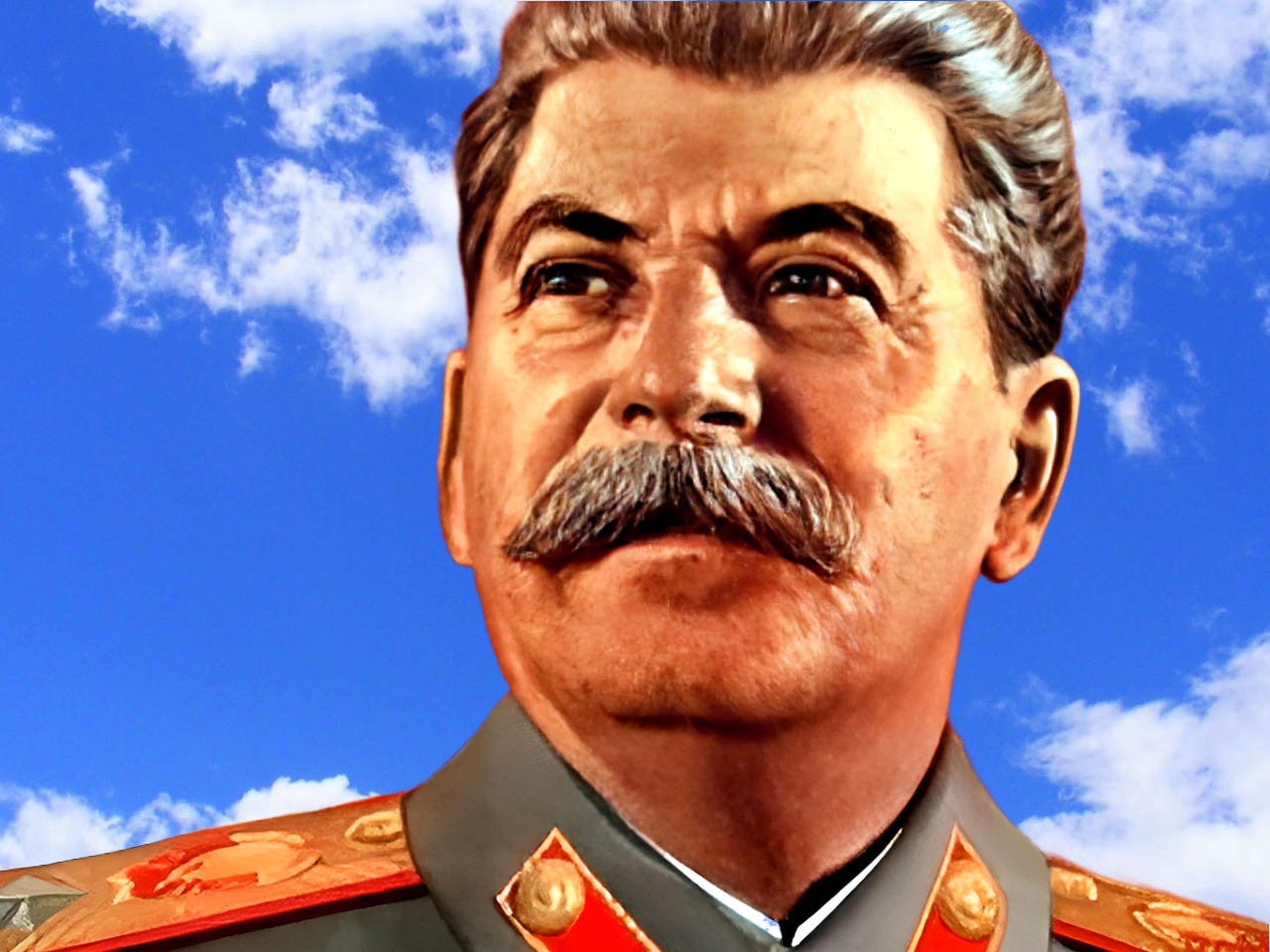The Stalin Question
Empire, myth, and the legacy of Soviet power
Alexander Dugin traces how one figure became at once emperor, executioner, and legend in the Russian mind.
Stalin’s immense popularity in contemporary Russia is a complex phenomenon.
The positive evaluation of Stalin by the majority of the people is linked to several factors:
The obvious successes of the USSR under his leadership: economic leap, material equality, victory in the war, territorial acquisitions, and ruthlessness towards the ruling elites (whom the people have traditionally hated).
Comparison with other leaders of the USSR — the chaos and violence of the Revolution and Civil War, where the heroic romanticism had greatly faded, making Lenin far less unambiguous; the quarrelsomeness and foolishness of Khrushchev; the stagnation and gradual senile degradation of Brezhnev. Against this backdrop, Stalin appears splendid. A true Emperor.
The fact that Stalin was attacked most fiercely by those liberals of perestroika and the 1990s who were utterly repulsive to the people — petty, Russophobic, and corrupt. Compared to these small vermin, who only destroyed, betrayed, sold out, and mocked everything, Stalin appeared divine. The baseness of his critics contributed to Stalin’s elevation.
Against this background, other aspects of Stalin have been almost entirely lost: the inhuman cruelty of his methods of seizing and maintaining power, a hypertrophied Machiavellianism, the actual destruction of the peasantry during industrialization and urbanization, the imposition of a crude and artificial anti-Christian ideology, repressions against the guilty and the innocent alike, including children, and much more.
The position of Russian patriots and of the Church regarding Stalin has been divided. Under the influence of points 1-3, and especially because of the nationwide hatred of the liberals, not only the left, but also the right, and even the Orthodox came to view Stalin favorably. This mythical imperial Stalin entirely displaced the reality.
A minority of patriots and Church figures, however, saw in Stalin the executioner of the Russian people and the persecutor of Orthodoxy. Yet precisely because of the anti-Stalinism of the liberals, who evoke in the people an insurmountable disgust, this position became not only unpopular but dangerous. Anyone who voiced it could be accused of liberalism, which is the most terrible discreditation for a Russian person — and quite rightly so.
Today, the time for a more balanced assessment of Stalin has still not come; contrasting ideological myths remain at work. But that time must come eventually. In general, Russian history and our people must soberly and responsibly, dialectically and spiritually, evaluate the Soviet period — its meanings, its paradoxes, its place in the larger Russian structure, as well as its leaders and its most striking personalities.
The obvious obstacle to this is the very existence of liberals. As long as they exist, the entire perspective is shifted and distorted, and no serious analysis is possible. Only when they disappear entirely from our society will Russians, freed from this infection, be able to ask themselves: what was all this? A clouding of consciousness, a collapse, or an ascent?
Perhaps it is time to begin discussing this topic not in public (avoiding rhetoric and polemics in every possible way) but in closed Russian circles? Today, everything immediately spills into the network, into a stream, into the outside world. Yet subtle and non-obvious questions require an entirely different atmosphere.
We need closed Russian circles, organic communities of people of our land and our history. It is within them that deep meanings can be clarified. Russians must learn to listen to Russians and to speak in an entirely different tone. For far too long, someone else has spoken in our name, intentionally or unintentionally distorting the structures of our thought. This has become a habit.
The crystallization of thought requires special conditions. Viktor Kolesov demonstrates that the Russian word dumat’ (“to think”) consists of the root um (“mind”) and a very ancient generalizing prefix d, long since fused with the root. That is, “to think” (dumat’) always means to think together, communally, in a circle. One can reflect (myslit’) alone, but one can think (dumat’) only with everyone. Hence the very name Boyar Duma. The boyars [landowning aristocracy] gather and think together. It is an institutionalized Russian circle.
(Translated from the Russian)




You might be interested in the following: On Stalin
https://ponerology.substack.com/p/lobaczewski-was-right-stalin-had
Who is Lobaczewki? And his lifetime work : Political Ponerology
An introduction:
https://www.sott.net/article/152452-Political-Ponerology-A-Science-of-Evil-Applied-for-Political-Purposes
Mr. Lobaczewski 's book :
http://www.amazon.com/Political-Ponerology-Science-Adjusted-Purposes/dp/1897244258/
A transcript of an interview with Mr. Lobaczewski ;
https://www.sott.net/article/159686-In-Memoriam-Andrzej-M-obaczewski
What about if people “liked” him because they would get killed or imprisoned if they didn’t ?